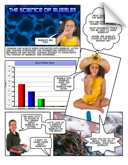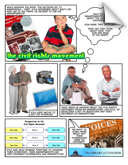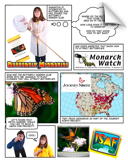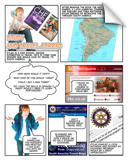Information, Technology and Lifestyle
 How can you make information and technology a seamless part of the teaching and learning environment? Just like a fitness program, it needs to become part of your lifestyle rather than an "extra."
How can you make information and technology a seamless part of the teaching and learning environment? Just like a fitness program, it needs to become part of your lifestyle rather than an "extra."
Instead of adding a separate "technology" heading in a lesson that says you're "using the Internet" or "using a digital camera," work toward a focus on timely, authentic learning environments with the philosophy that the Internet is a great source of current events information and the digital camera is a wonderful tool for recording real-world experiences.
Many traditional assignments involve three simple steps: a teacher-generated question, a search for THE answer, and a final product containing THE answer. For example, what are the causes of the Civil War?, let's look it up in Wikipedia and create a PowerPoint presentation with bullet points copied from Wikipedia. Technology is often a quick way to find an answer or an after-thought to the lesson assignment involving a Google search and typing a paper.
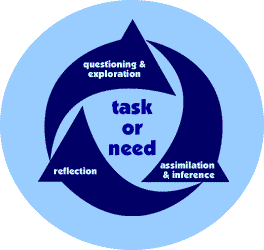 Information inquiry involves the processes of searching for information and applying information to answer questions we raise personally and questions that are addressed to us. Techniques for gaining meaningful information may involve reading, listening, viewing, observing, interviewing, surveying, testing and more.
Information inquiry involves the processes of searching for information and applying information to answer questions we raise personally and questions that are addressed to us. Techniques for gaining meaningful information may involve reading, listening, viewing, observing, interviewing, surveying, testing and more.
Meaningful information application comes from analysis of information need, analysis of information gained, and synthesis of information to address the need in the most efficient and effective manner possible. The five interactive components of information inquiry are (Callison): questioning, exploring, assimilation, inference, and reflection.
The FIT Flywheel
Like an exercise program, a mental workout involves a warmup, deep thinking, and cooldown. A quality workout involves your mind and your body. While yoga is a great example in the physical fitness realm, information inquiry represents the mental fitness area.
 As you analyze your lessons, think about a flywheel, a rotating disk that can store kinetic energy. It's momentum can be used to shift directions or move to new levels.
As you analyze your lessons, think about a flywheel, a rotating disk that can store kinetic energy. It's momentum can be used to shift directions or move to new levels.
Unlike a cycle where you come back to the beginning, an inquiry flywheel encourages thinkers to move toward deeper understandings and new directions. Although you may revisit the original questions, your thoughts evolve as you assimilate information.
Let's explore the FIT flywheel: Warmup, Deep Thinking, Cooldown Flywheel.
Warmup Flywheel
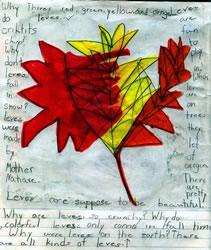 Involve children in learning by placing them in the center of the inquiry. Get them involved with questioning and exploration, building momentum with each round.
Involve children in learning by placing them in the center of the inquiry. Get them involved with questioning and exploration, building momentum with each round.
- What do I already know?
I need to recall my prior knowledge. - What information and activities do I need to lay a foundation for inquiry? (i.e., text, graphics, audio, video)?
I need to know enough to ask good questions. - What are the essential questions?
I need to focus on the "big ideas".
- What tools and techniques will I use for my inquiry?
I need to apply strategies for locating and evaluating information.
Use books, websites, audio, and video to jumpstart a project. Help them categorize questions and associate their questions with those posed by the standards, textbooks, and adults.
- Why are leaves so crunchy?
- Why do colorful leaves only come in fall time?
- Why don't leaves fall in snow?
- Why are there red, green, yellow, and orange levels?
Deep Thinking Flywheel
As students dig deeper in a cycle of questioning and exploration, they assimilate the information they find and draw inferences. This leads to more questions and exploration. Finally, students begin thinking about ways to synthesize and share their ideas.
- How can I assimilate what I've found?
- What inferences can I make?
- What other questions do I have?
Cooldown Flywheel
As students wind-down their inquiry, they reflect on their experience. What comes next?
- Who needs to know?
- How can I share my understandings?
Transform Classrooms Assignments

In some ways, classroom assignments haven't changed in nearly a century. Students are assigned a topic or questions. In the past, they went to go to the library shelf to find World Book Encyclopedia. Today, they search Wikipedia or google the topic. In the old days, they'd copy excerpts by hand. Today, students simply pull down the Edit menu and choose Copy. Finally they turn in the project to their teacher for a grade. This activity doesn't take much time, but it also doesn't excite students or address the standards.
Let's explore "snapshots" of projects that stimulate thinking, encourage imagination, and promote transfer of learning to new situations. Comic Life software was used for creating these examples and is available for Mac and Windows (soon) from Plasq. Be sure to check out the educator buy program. Click on each of the images below to see the full-page version.
You may say that these types of projects take more time. However think about the time spent reteaching concepts that students don't "get" the first time. How many times in the curriculum to we teach the life cycle? What if we could build on each experience promoting a spiral of learning?
Exuberance: Passion for Life and Learning
The stresses of teaching have caught up with many educators and student interest in school is at an all-time low. How do we transform our schools into motivating learning environments were educators are passionate about teaching and young people excited about learning?
Use the Visual Thesaurus to look up "exuberant, " passion," and "enthusiasm".
 In Exuberance: The Passion for Life, Kay Redfield Jamison explores how exuberance fuels our most important creative and scientific achievements. She states that "by its pleasures, exberance lures us from our common places and quieter moods; and - after the victory, the harvest, the discovery of a new idea or an unfamiliar place - it gives ascendant reason to venture forth all over again. Delight is its own reward, adventure its own pleasure." (p. 4).
In Exuberance: The Passion for Life, Kay Redfield Jamison explores how exuberance fuels our most important creative and scientific achievements. She states that "by its pleasures, exberance lures us from our common places and quieter moods; and - after the victory, the harvest, the discovery of a new idea or an unfamiliar place - it gives ascendant reason to venture forth all over again. Delight is its own reward, adventure its own pleasure." (p. 4).
What are the traits of an exuberant person? Are you exuberant?
"Science, like the arts, is rooted in the desire to understand and then create; society requires that this desire be transferred to succeeding generations. It is teachers who convey it, especially the exuberant ones." (p. 229)
What do you see as your most important role as educator?
"To teach well, I heard early and often, is to make a difference. To teach unusually well is to create magic. It is a magic often rooted in exuberance. Great teachers infect others with their delight in ideas, and such joy, as we have seen - whether it is sparked by teaching or through play, by music, or during the course of an experiment - alerts and intensifies the brain, making it a more teeming and generative place. Intense emotion also makes it more likely that experience will be etched into memory...To teach is to show, and to show persuasively demands an active and enthusiastic guide." (p. 226-227)
What do you do with students that’s magical? What are the characteristics of this environment?
Life-long Learning
Combining information, technology, and inquiry as a regular part of the teaching and learning process contributes to a passion for learning.
Inquiry Starters for Pre-teens and Teens
Look for authentic investigations that connect to teen interests. Which resources do you believe and why? How can you learn more through testing and collecting evidence? How do you make a decision? How do you debate an issue? How do you ensure that your information is accurate and timely? Is Pluto a planet? Are the glaciers melting?
Think about topics, resources, and technologies that could be used to facilitate authentic learning experiences.
- Social Issues
- Technology Issues
Think about products that are motivating to young people such as Graphic Novels.
- Graphic Novels from Teenspace
- Comic Life Software


